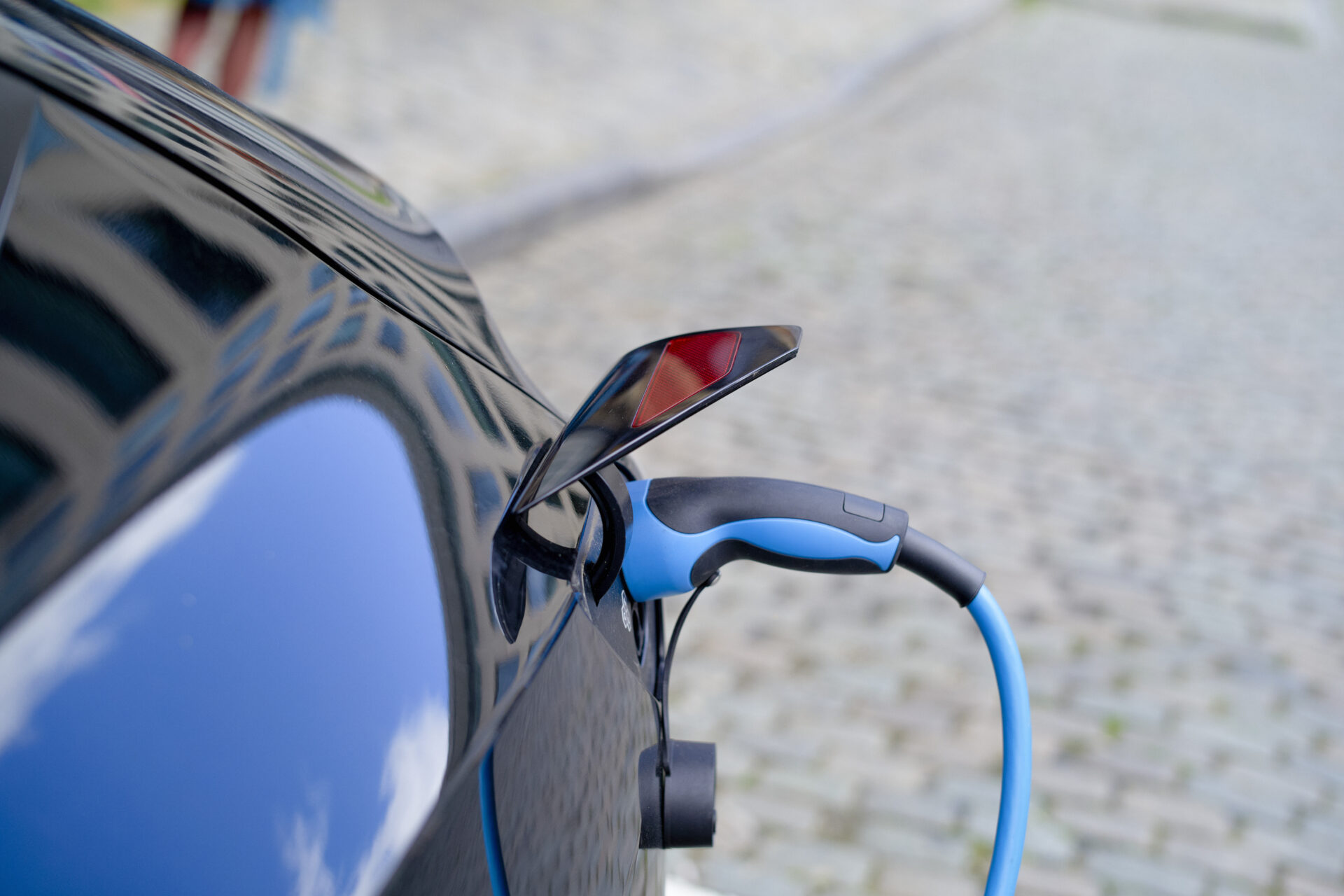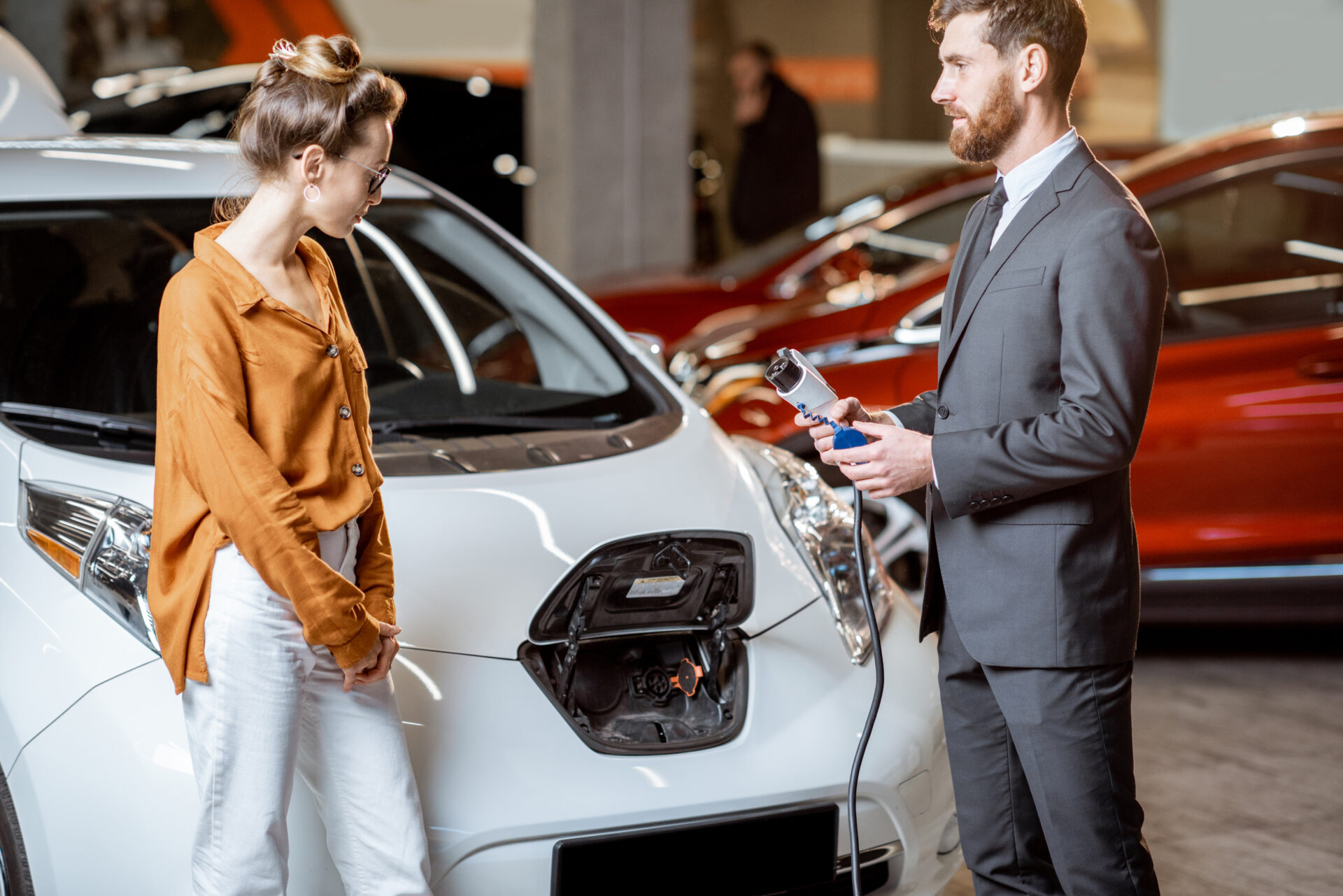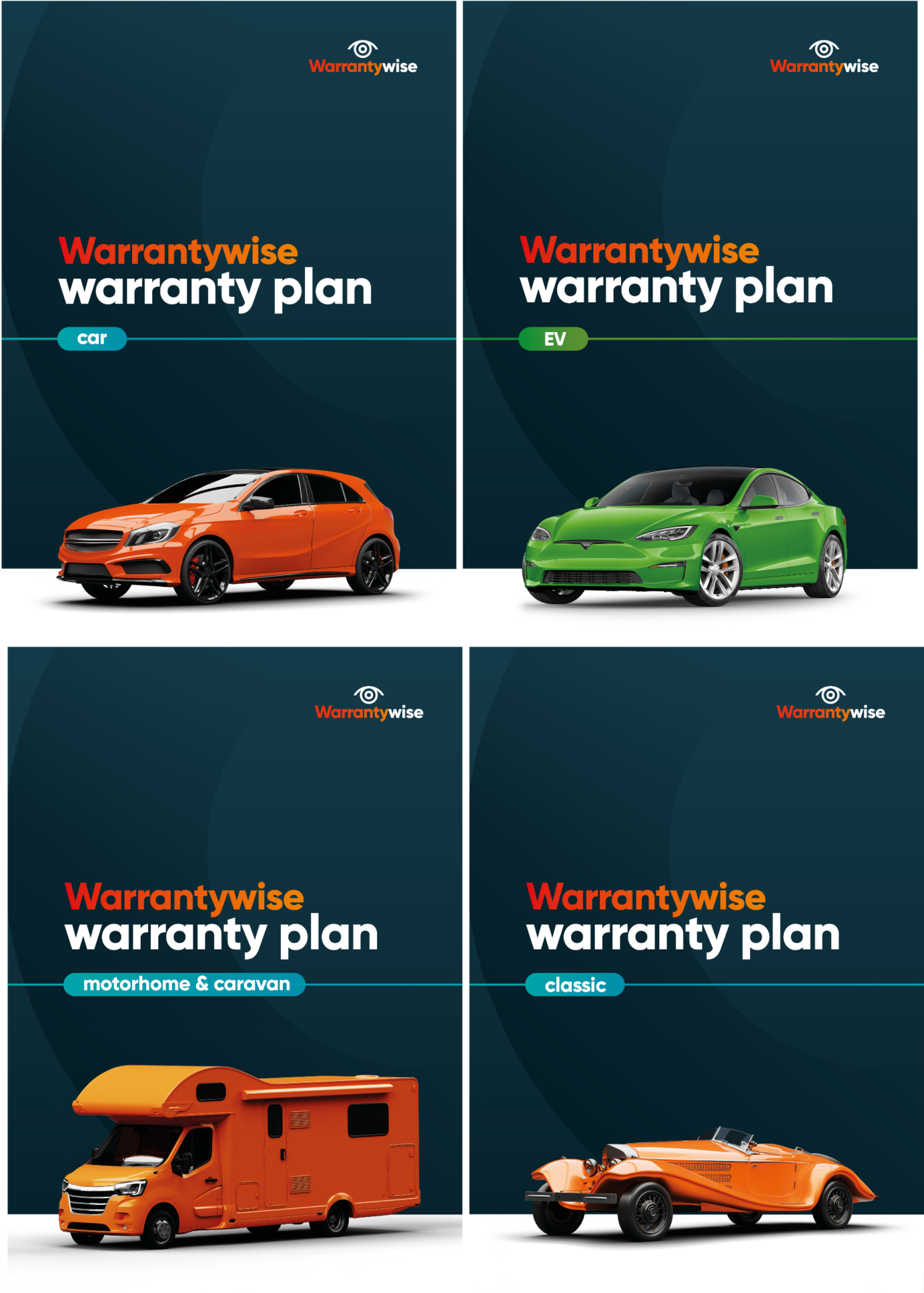
(Approx: 6min read)
The UK has seen significant growth in both electric vehicle (EV) and hybrid vehicle (MHEV/HEV/PHEV) second-hand car sales during 2025.
Second-hand EV sales have surged by 58.5%, accounting for a record 3.3% share of the overall used car market [1], while second-hand hybrid cars – across the three types – grew by over 30%, reflecting growing consumer interest in cleaner and more efficient transport options. This growth is driven by greater affordability, wider choice, government initiatives and a growing awareness of environmental benefits.
If you’re considering one of these vehicle types, this guide will help you determine the best option for your budget, driving needs and lifestyle.

Key facts at a glance:
- EVs are powered solely by electrical charge from a battery, whereas hybrids are powered by a petrol/diesel engine working alongside a battery.
- All EVs require plugging in to recharge, whereas some types of hybrid (HEVs) do not require plugging in at all. However, some do (PHEVs).
- Average prices on the second-hand market see EVs start at around £14k, rising to £70k+ for luxury used models.
- Hybrids start at around £15k and can rise to the same prices as EVs for high-end models.
- EVs often have lower running costs than hybrids due to cheaper electricity and fewer moving parts, although initial purchase prices may be higher.
- When purchasing either type of vehicle on the second-hand market, buyers should be sure to consider service history, wear and tear and how long is left on the battery warranty.
First – what is the difference between an electric and a hybrid vehicle?
The short answer here is that an EV is powered solely by electrical charge, whilst hybrids are powered by a combination of electrical charge working alongside an internal combustion engine of some sort.
A more detailed breakdown:
Electric vehicles. (EVs)
- Powered solely by electricity stored in high-voltage batteries.
- No internal combustion engine whatsoever.
- Zero direct emissions.
- Can only be charged by plugging into an external power source.

Hybrid vehicles. (MHEV/HEV/PHEV)
- Combine a petrol or diesel internal combustion engine with an electric motor in one of three ways:
- Mild hybrids (Mild Hybrid Electric Vehicle – MHEV): Cannot run on electric power alone at any point. Electric motor simply assists the engine for improved performance and economy.
- Full hybrids (Hybrid Electric Vehicle – HEV): Can run on electric power alone for short distances. The internal combustion engine fully charges the battery, does not require plug in to charge.
- Plug-in hybrids (Plug-in Hybrid Electric Vehicle – PHEV): Engine can charge the electric battery to an extent, but needs plugging in to charge properly due to vastly increased battery size compared to HEV. Longer electric-only range.

How expensive are EVs on the second-hand market?
This, of course, depends a lot on model, age, mileage and condition. However, we have provided some average breakdowns below for your consideration.
All prices reflect typical UK used market values in mid-2025 for models about 2-4 years old — usually from 2021–2023 — depending on condition, mileage, trim, and location.

Entry level EVs.
Short-range driving with lower initial prices.

| Model | Approximate Used Price Range (£) | Realistic Range (miles) | Key Notes |
|---|---|---|---|
| Nissan Leaf (40 kWh) | 15000 – 22000 | 125–150 | Early generation popular EV, proven reliability |
| Renault Zoe | 14000 – 20000 | 130–160 | Compact, affordable, popular in UK urban areas |
| Vauxhall Corsa-e | 18000 – 26000 | 200 | Recent, good range for price |
Mid-range EVs.
Greater range, more practical for families or longer commutes.

| Model | Approximate Used Price Range (£) | Realistic Range (miles) | Key Notes |
|---|---|---|---|
| Kia e-Niro | 28000 – 35000 | 280–300 | Affordable SUV, excellent range and features |
| Hyundai Kona Electric | 27000 – 35000 | 280–300 | Popular compact SUV with solid range |
| Tesla Model 3 | 30000 – 45000 | 270–310 | Premium saloon, excellent range & performance |
Premium EVs.
Higher price, longer range, advanced tech.

| Model | Approximate Used Price Range (£) | Realistic Range (miles) | Key Notes |
|---|---|---|---|
| Tesla Model S | £45,000 – £70,000 | 300–370 (varies) | Luxury saloon, long range, strong performance |
| Mercedes EQC | £45,000 – £60,000 | 220–250 | Premium SUV with strong build & comfort |
| Audi e-tron | £40,000 – £60,000 | 220–250 | Spacious luxury SUV, good tech features |
Used EV summary:
- Price range: Starting as low as £14,000 for smaller, ‘city’ EVs, up to £70,000+ for luxury examples.
- Running costs: Typically lower than hybrids; electricity is cheaper than fuel and servicing more straightforward.
- Charging: Requires home or public charger/supercharger access.
- Battery health: Check battery capacity and warranty on any used vehicle. Overall range can degrade over time.
How expensive are hybrids on the second-hand market?
Again, it depends a lot on model, age, mileage and condition. However, we have provided some average breakdowns below for your consideration.
All prices reflect typical UK used market values in mid-2025 for models about 2-4 years old — usually from 2021–2023 — depending on condition, mileage, trim, and location.

Used full hybrids (HEV).
Self charging, no plugin required, short electric-only range.

Used plug-in hybrids (PHEV).
Longer electric-only range, require plugging in to charge electric motor.

| Model | Approximate Used Price Range (£) | Typical Electric Range (miles) | Information |
|---|---|---|---|
| Mitsubishi Outlander PHEV | 22000 – 34000 | 25–28 | UK’s best-selling PHEV, practical SUV with decent electric range |
| Volvo XC40 Recharge PHEV | 30000 – 40000 | 26–30 | Premium compact SUV, strong safety ratings |
| BMW 330e | 28000 – 40000 | 30–35 | Sporty executive saloon, refined driving |
| Mini Countryman PHEV | 25000 – 34000 | 26–32 | Stylish compact SUV, fun to drive |
| Kia Sorento PHEV | 35000 – 50000 | 30–33 | Large family SUV with 7 seats |
Used hybrid summary:
- Price range: Typically from £15,000 for smaller full hybrids (HEVs) up to £50,000+ for luxury plug-in hybrids (PHEV).
- Running costs: Generally lower than petrol or diesel cars, but refuelling and normal engine maintenance costs should be considered.
- Charging: Only plugin hybrids (PHEV) need this consideration.
- Battery warranty: Usually included for 8 years from new on manufacturer’s warranty. Protected by extended warranty products thereafter.
Key considerations when choosing between a used EV or hybrid:

Leaning towards an EV? Here are six of the best second-hand EVs you can buy in 2025:
The best used electric vehicle (EV) in the UK in 2025 depends on your priorities such as budget, range, size and features. However, several models consistently stand out for their reliability, range, and overall value:
TESLA Model 3.
Range: Around 270-310 miles per charge.
Pros: Excellent driving performance, long range, established charging network and premium features.
Second-hand price: Typically £30k – £45k for 2-4 year-old models.
Ideal for: Those seeking a mid-range EV with a long range and sporty feel.
NISSAN Leaf.
Range: 125–150 miles per charge
Pros: Affordable, proven reliability, good for urban and short-range use.
Second-hand price: Typically £15k – £22k.
Ideal for: Urban drivers on a budget or a first EV purchase.
VAUXHALL Corsa-e.
Range: Approximately 200 miles per charge.
Pros: Compact, easy to drive, good value for money.
Second-hand price: Typically £18k – £26k
Ideal for: Urban drivers on a budget who require slightly more range.
HYUNDAI Kona Electric.
Range: Around 280–300 miles per charge.
Pros: Well-regarded for reliability, comfort, and range; widely available.
Second-hand price: Typically £27k – £35k
Ideal for: Those looking for a dependable compact SUV EV.
KIA e-Niro.
Range: Around 280-300 miles per charge.
Pros: Practical as a compact SUV, great range for price, reliable.
Second-hand price: Typically £28k – £35k.
Ideal for: Families and drivers seeking an affordable and spacious EV.
RENAULT Zoe.
Range: Around 190-240 miles per charge.
Pros: Good urban vehicle, easy to park, good value for money.
Second-hand price: Typically £8k – £12k.
Ideal for: Budget-conscious buyers seeking a practical solution.
Leaning towards a hybrid? Here are six of the best second-hand hybrids you can buy in 2025:
The best used hybrid to buy in the UK in 2025 also depends on your priorities — such as budget, car size, economy, reliability, and the type of journeys you make. However, several models consistently stand out for their proven reliability, efficiency, and features in the UK used market:
**The options below contain a mixture of full (HEV) and plugin (PHEV) hybrids.
TOYOTA Corolla (HEV).
Type: Full (self-charging) hybrid.
Pros: Excellent reliability (high Reliability Index score), fuel economy, low running costs, comfortable.
Second-hand price: Typically £16k – £24k.
Ideal for: Families, commuters, anyone seeking trouble-free ownership.
LEXUS RX450h (HEV).
Type: Full (self-charging) hybrid.
Pros: Renowned Lexus build quality, comfort, premium feel, strong reliability scores.
Second-hand price: Typically £30k – £45k.
Ideal for: Families needing more space, and solid reliability.
Toyota Prius (HEV).
Type: Full (self-charging) hybrid.
Pros: Iconic hybrid with a proven track record, famous for its durability and low emissions.
Second-hand price: Typically £15k – £22k.
Ideal for: High-mileage drivers, taxis, those prioritising economy and reliability.
MITSUBISHI Outlander (PHEV).
Type: Plug-in hybrid.
Pros: Spacious, practical SUV—UK’s best-selling PHEV.
Second-hand price: Typically £22k – £34k.
Ideal for: Families or company car drivers who can cover most miles on electrical power.
KIA Sportage (PHEV).
Type: Plug-in hybrid.
Pros: Great blend of practicality, comfort and efficiency.
Second-hand price: Typically £28k – £35k.
Ideal for: Families or company car drivers who can cover most miles on electrical power.
BMW 330e (PHEV).
Type: Plug-in hybrid.
Pros: Sporty executive saloon with engaging drive.
Second-hand price: Typically £28k – £40k.
Ideal for: Daily commuters who mostly make short trips to maximise electric use.
What makes these EVs/hybrids the best options?
There are certainly more good EV/hybrid options available, but the 12 model examples above all perform well for:
- Reliability: Toyota, Lexus, Hyundai and Kia consistently score well in Warrantywise’s Reliability Index, making them strong choices for second-hand ownership.
- Fuel economy (hybrids): Most hybrids – including the ones above – normally achieve 50-60mpg+ in real-world UK driving.
- Low running costs: Minimal servicing and good parts supply; reduced tax costs and reduced ULEZ/Clean Air Zone compliance.
- Resale value: Popular models like the Prius, Model 3 and Corolla retain value well (when bought used in the first place).

Specific things to think about when buying either an EV or a hybrid:
- Battery warranty: How long is left? Toyota Lexus and others often offer up to 8-year/100,000 mile EV or hybrid battery warranties. (By ‘battery’, we refer to the high-voltage drive battery that actually moves the car, not the small ‘auxiliary’ battery that all cars have)
- Service history: Opt for cars with a full service history.
- Wear and tear: Look for good general upkeep, check consumables (brake pads, wiper blades etc) for condition.
The benefits of a used EV/hybrid warranty:
All the EV’s and hybrids mentioned in this post are popular, well made vehicles. However, they are ‘used’ by definition and, as such, subject to the need for regular servicing and repairs due to aging. So, getting an extended EV/hybrid warranty will help to give you peace of mind.
A good EV/hybrid warranty includes key electric vehicle parts like the auxiliary battery, onboard charger, power inverter, DC to DC converter and traction motor. It should also protect the power regeneration braking system, thermal cooling system, braking components, electrical issues and key fobs.
EV warranty options:
With Warrantywise, you can choose from two main plans for EV: ‘EV Plus’ for newer cars (up to 4 years old and under 40,000 miles) with extra benefits like emergency breakdown, car hire, and parts replaced in pairs; and ‘EV’ for older cars (up to 15 years old and under 150,000 miles) with similar inclusions but fewer extras.
The warranty pays for parts and labour due to premature failure and includes unlimited repairs up to the car’s value, with zero compulsory contribution (unless you’d like to add one to your plan). Proper servicing is required to keep the warranty valid.
Hybrid warranty options:
Warrantywise provides a range of options for your hybrid car, be it MEV, HEV or PHEV. Similarly to EV warranty products, the warranty pays for parts and labour due to premature failure and includes unlimited repairs up to the car’s value, with zero compulsory contribution (as with EV, unless you’d like to add one to your plan). Again, proper servicing is required to keep the warranty valid.
As there are more model options and complications here, please contact our sales team on 01254 355 100 with your car’s make and model and we can provide you with the best warranty options for your needs and budget.

So, what should I choose – EV or hybrid?
It all depends on your needs, lifestyle and budget. Hopefully the information above has gone some way to inform and help you make an educated choice.
To conclude:
Used hybrids are great if you want flexibility, longer range and less limited necessity to charge, with decent savings on running costs. Typical prices range from mid-£10,000s to around £50,000 depending on model and specification.
Used EVs offer the best environmental benefits and lowest running costs but all require convenient and regular charging access. They cover most UK drivers’ daily needs with ranges of 150–300 miles and prices starting from mid-£10,000s up to luxury models above £60,000.
Discover more:.
Further Warrantywise articles you might find useful…

EV Battery Cold Weather Performance: Myths Busted.
Does cold weather really drain EV batteries faster? Many drivers worry about winter range loss, but how much of it … Continued

Fact or fiction? Debunking popular EV myths.
Are EVs really worse for the environment? Do they take forever to charge? Despite growing adoption, misconceptions about electric vehicles … Continued

Hatchback or small SUV: Which is the smarter second-hand buy?
(Approx: 7min read) If you’re choosing a used car in 2025, the decision often comes down to two popular categories: … Continued
Sources of information in this article:











